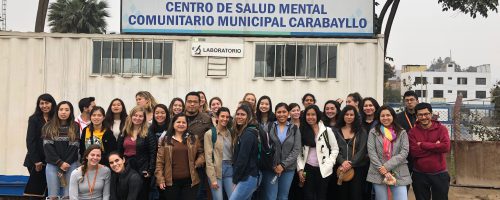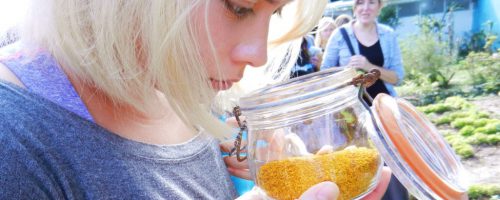UCLA Travel Study
Global Health: Global Health in Peru
*Program not currently offered*
Peru was home to the Incas and several pre-Incan cultures that built a historical, archaeological and cultural legacy that includes the Machu Picchu World Heritage site.
Peru is currently home to 14 language groups, including half of the world’s Quechua speakers, and 44 different ethnic groups, most of whom live in the Amazon region. Peru is also one of 17 mega-diverse countries, hosting 84 ecosystems and ranking in the top five worldwide for amphibian, bird, butterfly, fish, mammal and reptile species diversity.
Spend your summer in Peru, an incredibly rich country in terms of history, archaeology, as well as cultural and ecological diversity. This program helps students reach a better understanding of how diversities and disparities in people and places impact human health, using Peru as a case study. This unique opportunity provides you with first-hand experience in the global health field with various visits to local hospitals, health NGO’s, as well as trips outside of Lima to Iquitos, Peru.
This program is run through the UCLA International Institute and the UCLA David Geffen School of Medicine (DGSOM), with support from the UCLA Latin American Institute and the Universidad Peruana Cayetano Heredia.
Curriculum
Required Courses
All students will enroll in two required courses while attending the program:
- GLB HLT 110 A (4 units)
- GLB HLT 110B (4 units)
Course Descriptions
GLB HLT 110A: Global Health in Practice (4 units)
Prerequisites: None
This course introduces students to important concepts and topics in global health, including the burden of disease, global health actors and the Millennium and Sustainable Development Goals, and provide significant opportunities to experience global health in the field.
Course counts toward the UCLA Global Health Minor.
GLB HLT 110B: Diversities and Disparities: The Case of Peru ( 4 units)
Prerequisites: None
This course aims to help students better understand how diversities and disparities in peoples and places impact human health, using Peru as a case study. After a general overview of the topic, we will explore key global health issues. For each health issue, we will review the “state of the issue” briefly at the global level and then more specifically within the context of Peru. Excursions will complement classroom lectures. We hope to enhance students’ understanding of the significant influence of diversities and disparities on the health of populations around the globe.
Course counts toward the UCLA Global Health Minor.
Syllabus/Schedule
TBA. Syllabus and schedule are subject to change at the discretion of the instructor.
Grading
Travel Study courses must be taken for a letter grade. Grades will be based on class attendance and participation, a group presentation, as well as a final term paper. Grading criteria is subject to change at the discretion of the instructor.
Textbooks
Course readers will be available.
Budget and Financial Aid
| Budget Estimate | UC Undergrads | UC Grad Students | Visiting Student |
| Program Fee | TBA | TBA | TBA |
| Textbooks (estimate) | $150 | $150 | $150 |
| Airfare (estimate) | $1300 | $1300 | $1300 |
| Meals (estimate) | $800 | $800 | $800 |
| Spending Money (estimate) | $800 | $800 | $800 |
Program fee includes registration and course fees, accommodations, and program excursions.
Airfare, textbooks, optional courses, other meals, optional excursions, and any COVID-19 testing required for travel are additional.
Fees are subject to change by action of the UC Regents. View full fee disclaimer.
Document Fee
Non-UCLA students will be charged a $50 Document Fee. This is a one-time document fee which covers fees for first-class mailing of official transcripts, diploma and much more. Please visit the Registrar’s Office Website for more information. Matriculated UCLA Students: Please visit the Registrar’s Office Website for document fee information.
IEI Fee
All undergraduate students will be charged a $61 IEI fee per summer. The IEI (Instructional Enhancement Initiative) fee is a course materials fee that is charged in order to support the use of technology in undergraduate education at UCLA.
Budgeting
We recommend that you budget accordingly to cover optional sightseeing, laundry, Internet cafes, emergencies, etc. How much to budget depends on your travel, entertainment, and souvenir choices. It is always best to overestimate your spending. Take the time to research the cost of living in your destination and the activities you want to participate in while abroad.
Purchasing Airfare
Please do not purchase airfare until instructed to do so by your Travel Study Program Coordinator.
Financial Aid
Financial aid for Travel Study programs is available to qualified UCLA students. All other students should inquire about financial aid at their home institution. For details about the financial aid application process, please visit the Financial Aid section of this website.
On Location
Accommodations
Students live in centrally-located hotels in both Lima and Iquitos. Students will stay in double occupancy rooms.
UCLA Travel Study reserves the right to change the housing location. Should this become necessary, we will arrange comparable accommodations elsewhere.
Meals
Daily breakfast is provided at the hotels, no other meals are included.
If you have strict dietary requirements, this program may not be able to accommodate your needs. Please let us know when you apply for this program if you have special dietary needs as well as any physical or medical conditions. We will advise you accordingly.
Excursions
This program includes several excursions as part of its curriculum. Possible excursions include visits to Pampas, Belen, indigenous communities, local health NGO’s, a Butterfly Farm, the zoo, as well as Museo Larco.
A schedule of excursions will be available at a later date.
Limited free time is built into this program for independent sightseeing. If you plan on traveling extensively, we recommend that you budget additional spending money.
Sai Sreenivasan
Travel Study Ambassador, 2019
Third year student at UCLA
Human Biology and Society major
Mika Nagamoto
Program Correspondent, 2018
Psychology major and Global Health minor






